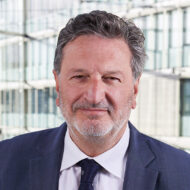Why we must invest in UHC
For millions of people worldwide out-of-pocket health expenses translate to out-of-reach opportunities for the future. Children miss out on essential immunizations, women die giving birth in unsafe environments, and people are at risk of going blind or having a stroke before they realize they are not properly controlling their diabetes. To quote Dr Tedros Adhanom Ghebreyesus, Director-General of the World Health Organization, “It is completely unacceptable that half the world still lacks coverage for the most essential health services. And it is unnecessary. A solution exists: universal health coverage (UHC) allows everyone to obtain the health services they need, when and where they need them, without facing financial hardship.”
For UHC to become a reality, governments need to invest more in health and create partnerships – key points of an expert panel discussion “Accelerating Global Health Progress.” The event, hosted by IFPMA (International Federation of the Pharmaceutical Manufacturers Association), brought together government decision-makers and leading players in the field of global health to explore ways to strengthen existing health systems to achieve UHC.
Key panellists in this event were:-
- Prof Ilona Kickbusch, Graduate Institute, Director of Global Health
- Dr Svetlana Akselrod, WHO Assistant Director General for Non-Communicable Diseases and Mental Health
- Dr Emmanuel Ankrah Odame, Director of Policy Planning, Monitoring and Evaluation of the Ministry of Health, Ghana
- Prof Robert Yates, Chatham House, UHC Policy Forum, Centre on Global Health Security
- Prof Gerald Yonga, East Africa NCD Alliance
Here are the top 5 take-aways from the discussions:
- Health is the wisest investment a country can make
The link between health spending and economic growth has been well-documented and widely acknowledged, and health and well-being are considered essential to achieving the sustainable development goals, especially those critical to “leaving no-one behind”. For countries that are on the road to development, investing in health means investing in people and thus advancing country’s human potential. As countries build their health systems, it is important to consider the health economy as generating resources for a country and thus a driver of growth and wealth. This is the notion of investment. For example, if a country builds its health system, it will also build up its health work force – nurses, general practitioners, specialists, educational institutions. This means investing more in education, which in turn generates growth. The panel emphasized that UHC reforms are as much political as they are technical. Discussions centred around the need for a dual strategy that makes for the economic case but is equally crucial for making a political case, as there are clear benefits for strengthening political constituents.
- It’s not just about providing health care – it’s about providing quality health care
Providing quality healthcare services is a challenge for countries at all income levels – a Lancet report found that over 8 million people die annually in low-and middle-income countries because of “inadequate access to quality care.” The panel highlighted that even when the resources are allocated to health, in some countries the resources are diverted to equipment and not into the best buys. It must not be forgotten that 9.6 million lives could be saved by investing in the WHO’s Best Buys by 2025.
- Including NCDs in UHC is essential
With over 41 million people losing their lives to non-communicable diseases (NCDs) each year, integrating NCD services into primary health care systems is crucial. The case for tackling NCDs through UHC is best shown in East Africa and Sub-Saharan Africa more broadly, where people with hypertension or diabetes are confronted with challenges when trying to find drugs or point of care equipment for testing at the majority of dispensaries or health centres, where 80% of the population live. Another challenge they may face, is to shift the primary health care services that had previously focused on infectious diseases. A solution is to invest in training nurses, endocrinologists and other specialized doctors in detecting and treating NCDs at all levels of healthcare services, not just at the hospital-level. Panellists also emphasized the challenge in developed countries with the ageing population and importance of UHC in such context
Likewise, with the shift in lifestyle and an increase in urbanization rates, it will be hugely important to implement WHO best buys in terms of prevention. According to the WHO 2018 report, investing 1 USD today in prevention will have a return of 7 USD by 2030.
- Financing UHC
Financing is pivotal to UHC. While there is no magic bullet for financing UHC, but utilising the often less-used public financing mechanisms. This is inherently political. Today successful models of financing UHC have been using a hybrid system of compulsory public financing from social health insurance and general taxation. Each country is different. For Botswana the solution to funding UHC was to tax diamonds reserves; other countries might consider taxing their oil revenues; but not all countries have these natural resources to rely on. The solution is to develop the local financing mechanism; this would ensure UHC financing is less impacted by downturns in the economy. What came often from the discussion is that no one size fits all – we need systems tailored to specific context and settings with some pragmatism & flexibility
The watch word is “resilient” health systems that depend on “resilient” financing of UHC. To achieve that, strategic public private partnerships is crucial which leads us to point 5.
- Working hand in hand with private sector
There is a case for involving the private sector in order to take full advantage of new technological advances, interconnectivity, the digital revolution, the cell phone revolution, the ability to transfer data from remote spots, which will make healthcare more effective and also cheaper. Likewise, private sector has the potential to drive sustainable change and bring programs to scale.
Conclusion
While there are specific indicators or arguments that governments are trying to measure UHC against, one that stands out is human progress. That is the best argument for investing in UHC. The High Level Meeting (HLM) on UHC at United Nations General Assembly in September 2019 will offer a unique opportunity to foster political commitment and action, building on HLMs on AIDS, NCDs, AMR, and TB. UHC is viewed by the key panellists representing the global health community as the best policy platform for improving health and well being for all. We at IFPMA believe that UHC is critical in delivering the SDGs.
Links:
Author






